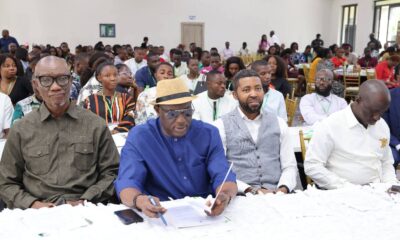Editorial
As Nigeria Prepares For 2011 Election
Activities marking the march to the next round of elections in Nigeria are picking up at a tremendous speed, thus preparing Nigerians to elect their leaders for the next term.
The year 2011 is around the corner with her expectations for political parties to conduct hitch-free primaries needed to choose candidates for the upcoming elections. There ought to be in place necessary structures that would portray the country in the light of being the true Giant of Africa.
Unfortunately, it appears that the country is not making commensurate progress in line with her human and material resources. Regrettably, while we continue to fumble, countries less endowed with such resources like Ghana, South Africa and even Kenya are making progress, especially in their political systems, which have received international acclamations.
Ghana’s smooth transition from the last Kuffour administration to that of Dr. Atta Mills last year was hailed worldwide and was acclaimed as a challenge for Nigeria. In like manner, South Africa’s successive successions have also left some food for thought for Nigeria.
Therefore, as the country marches to the next republic, politicians and political leaders need to prepare for the challenges of the moment and put their houses in order.
In the area of conducting credible elections, we as a country may not have much positive and plausible credentials to showcase but it is never too late to retrace steps and do the right things.
Interestingly, the present administration under President Umaru Musa Yar’Adua has been preaching amiably on the need for respect of Rule of Law, Due Process and Electoral Reforms.
The Tide expects that this administration to match such high rhetorics with the necessary actions in embracing the ideals of democracy by practicing what it preaches, in addition to making all institutions ready and willing to toe the same noble path.
Sadly, happenings within political circles in recent times have been less than charitable and should be a cause for concern, for keen followers of the democratic process.
Having practised democracy for more than 10 years now, Nigeria should be expected to exude the tenets of true democracy constitutionally enshrined and as practised within her institutions and political structures.
Sadly, internal democracy within the political parties still remain an illusion and such a reminder surfaced in Anambra State where governorship election has been scheduled for early next year, while parties unable to defend democracy are still running hither thither to meet up with the law.
The case in Anambra State is thus, a litmus test for our fragile democracy, the political institutions and their managers.
We, therefore expect the political class and elites to put their brace up for the litmus test of ensuring the survival of the Rule of Law and Due Process at every stage of the process of choosing candidates and conducting elections, not only in Anambra State but the whole country.
This, we believe, will ensure that our fragile democracy and once peaceful atmosphere is sustained.
For now, the Anambra example does not give many a reason to expect electoral excellence especially as the deadline for parties to field candidates for the February 2010 election wounds up today with some, still wandering in the political void.
After the horrible experiences of the last elections, and all the talks of reforms, one would have thought that the nation had learnt a lesson or two, but the hiccups in the Anambra electoral process points to the opposite. Now, is the time to make it work.
Editorial
Benue Killings: Beyond Tinubu’s Visit

The recent massacre in Yelewata, Benue State, ranks among Nigeria’s deadliest attacks of
2025. While official figures put the death toll at 59, media reports and Amnesty International estimate between 100 and 200 fatalities. This atrocity extends a decade-long pattern of violence in Nigeria’s Middle Belt, where Beacon Security data records 1,043 deaths in Benue alone between May 2023 and May 2025.
President Tinubu’s visit on 18 June—four days after the 14 June attack—has drawn sharp criticism for its lateness. This delay echoes a history of inadequate responses, with Human Rights Watch documenting similar inaction in Plateau and Kaduna states since 2013, fuelling a culture of impunity. The attack lasted over two hours without meaningful security intervention, despite claims of swift action.
The violence bore hallmarks of genocide, with survivors recounting systematic house burnings and executions. More than 2.2 million people have been displaced in the region since 2019 due to comparable attacks. Data show Benue’s agricultural output falls by 0.21 per cent in crops and 0.31 per cent in livestock for every 1 per cent rise in violence.
Security forces continue to underperform. No arrests were made following the Easter attacks in April (56 killed) or May’s Gwer West massacre (42 killed). During his visit, Tinubu questioned publicly why no suspects had been detained four days after Yelewata, highlighting entrenched accountability failures.
The roots of the conflict are complex, with climate change pushing northern herders south and 77 per cent of Benue’s population reliant on agriculture. A Tiv community leader described the violence as “calculated land-grabbing” rather than mere clashes, with over 500 deaths recorded since 2019.
Government interventions have largely fallen short. The 2018 federal task force and 2025 Forest Guards initiative failed to curb violence. Tinubu’s newly announced committee of ex-governors and traditional rulers has been met with scepticism given the litany of past unkept promises.
The economic fallout is severe. Benue’s status as Nigeria’s “food basket” is crumbling as farms are destroyed and farmers displaced. This worsens the nation’s food crisis, with hunger surges in 2023-2024 directly linked to farming disruptions caused by insecurity.
Citizens demanding justice have been met with force; protesters faced police tear gas, and the State Assembly conceded total failure in safeguarding lives, admitting that the governor, deputy, and 32 lawmakers had all neglected their constitutional responsibilities.
The massacre has drawn international condemnation. Pope Leo XIV decried the “terrible massacre,” while the UN called for an investigation. The hashtag “200 Nigerians” trended worldwide on X, with many contrasting Nigeria’s slow response to India’s swift action following a plane crash with similar fatalities.
Nigeria’s centralised security system is clearly overwhelmed. A single police force is tasked with covering 36 states and 774 local government areas for a population exceeding 200 million. Between 2021 and 2023 alone, 29,828 killings and 15,404 kidnappings were recorded nationally. Proposals for state police, floated since January 2025, remain stalled.
Other populous nations offer alternative models. Canada’s provincial police, India’s state forces, and Indonesia’s municipal units demonstrate the effectiveness of decentralised policing. Nigeria’s centralised structure creates intelligence and response gaps, worsened by the distance—both physical and bureaucratic—from Abuja to affected communities.
The immediate aftermath is dire: 21 IDP camps in Benue are overwhelmed, and a humanitarian crisis is deepening. The State Assembly declared three days of mourning (18-20 June), but survivors lack sufficient medical aid. Tragically, many of those killed were already displaced by earlier violence.
A lasting solution requires a multi-pronged approach, including targeted security deployment, regulated grazing land, and full enforcement of Benue’s 2017 Anti-Open Grazing Law. The National Economic Council’s failure to prioritise state police in May 2025 represents a missed chance for reform.
Without decisive intervention, trends suggest conditions will worsen. More than 20,000 Nigerians have been killed and 13,000 kidnapped nationwide in 2025 alone. As Governor Hyacinth Alia stressed during Tinubu’s visit, state police may be the only viable path forward. All 36 states have submitted proposals supporting decentralisation—a crucial step towards breaking Nigeria’s vicious cycle of violence.
Editorial
Responding To Herders’ Threat In Rivers

Editorial
Democracy Day: So Far…

Nigeria’s return to democratic rule in 1999 marked a watershed moment in the nation’s political history. After enduring nearly 16 years of successive military dictatorships, Nigerians embraced a new era of civil governance with the inauguration of President Olusegun Obasanjo on May 29, 1999. Since then, the country has sustained a democratic system for 26 years. But, this democratic journey has been a complex mix of progress and persistent challenges.
The formal recognition of June 12 as Democracy Day in 2018 by former President Muhammadu Buhari acknowledged a long-standing injustice. The annulment of the 1993 presidential election, Nigeria’s freest, betrayed the democratic aspirations of millions. That it took decades to honour this date reflects the nation’s complex relationship with its democratic memory.
One of the most momentous successes of Nigeria’s democracy has been the uninterrupted civilian rule over the last two and a half decades. The country has witnessed seven general elections, with power transferring peacefully among different political parties. This is particularly notable considering that prior to 1999, no civilian government had completed a full term without military intervention. The peaceful transitions in 2007, 2015, and 2023 are testaments to Nigeria’s evolving democratic maturity.
Electoral participation, while uneven, has also reflected a level of democratic engagement. In 2003, voter turnout stood at about 69 per cent, but this figure dropped to approximately 34.75 per cent in 2023, according to the Independent National Electoral Commission (INEC). Although the declining turnout raises concerns, it also highlights the increasing expectations of the electorate, who demand credible and transparent elections.
Another area of progress is the growth of a vibrant and free press. Nigerian media has played a crucial role in holding governments accountable and fostering public discourse. Investigative journalism and civil society activism have exposed corruption and human rights abuses. The rise of social media has further expanded the democratic space, enabling young Nigerians to mobilise and advocate for change, as evidenced by the 2020 #EndSARS protests.
Judicial independence has seen mixed results. On one hand, the judiciary has occasionally demonstrated resilience, such as in landmark rulings that overturned fraudulent elections or curtailed executive excesses. On the other hand, allegations of political interference and corruption within the judiciary persist, undermining public confidence in the legal system’s impartiality.
Nigeria’s democracy has also facilitated the decentralisation of power through the federal system. State governments now wield some autonomy, allowing for experimentation in governance and service delivery. While this has led to innovative policies in some states, it has also entrenched patronage networks and uneven development across the federation.
Despite these successes, Nigeria’s democratic journey faces formidable problems. Electoral integrity remains a critical concern. Reports from election observers, including those from the European Union and ECOWAS, frequently highlight issues such as vote-buying, ballot box snatching, and violence. The introduction of the Bimodal Voter Accreditation System (BVAS) and electronic transmission of results in 2023 elections showed promise, but technical glitches and alleged manipulations dampened public trust.
Corruption continues to be a pervasive issue. Nigeria ranks 145th out of 180 countries on Transparency International’s 2023 Corruption Perceptions Index, with a score of 25/100. Democratic institutions meant to check graft—such as anti-corruption agencies and the legislature—often struggle due to political interference and weak enforcement mechanisms.
Security challenges have also strained Nigeria’s democracy. Insurgency in the North East, banditry in the North West, separatist agitations in the South East, and herder-farmer conflicts across the Middle Belt have collectively resulted in thousands of deaths and displacements. According to the Global Terrorism Index 2024, Nigeria ranks as the eighth most impacted country by terrorism. The government’s difficulty in ensuring safety erodes public confidence in the state’s capacity and legitimacy.
The economy poses another critical remonstrance. Nigeria’s Gross Domestic Product (GDP) per capita stands at approximately $2,400 as of 2024, with over 40 per cent of the population living below the national poverty line. High unemployment and inflation have fueled discontent and disillusionment with democratic governance, especially among youth. Without addressing economic grievances, the democratic dividend will remain elusive for many Nigerians.
Ethnic and religious divisions further complicate Nigeria’s democratic consolidation. Politicians often exploit identity politics for electoral gains, exacerbating social tensions. Although federal character principles aim to promote inclusiveness, they have also sometimes fostered a quota mentality rather than merit-based appointments.
Gender representation remains inadequate in Nigeria’s democratic institutions. Women occupy less than 10 per cent of seats in the National Assembly, one of the lowest rates globally. Efforts to pass gender parity bills have faced stiff resistance, highlighting deep-seated cultural and institutional barriers to female political participation.
Civil liberties, while constitutionally guaranteed, are under threat. Crackdowns on protesters, restrictions on press freedom, and surveillance of activists reveal an authoritarian streak within the democratic framework. The controversial Twitter ban in 2021 exemplified the country’s willingness to curb digital freedoms, prompting domestic and international criticism.
The political crisis in Rivers State embodies broader democratic struggles. Attempts to control the state through undemocratic means expose weaknesses in federal institutions and the rule of law. Immediate restoration of democratic governance in Rivers State is vital to preserving Nigeria’s democratic integrity and institutional credibility.
Local governments remain under the control of state governors, depriving citizens of grassroots democracy. Last year’s Supreme Court judgment on local government autonomy is promising, but state-level resistance threatens its implementation. Genuine autonomy would bring governance closer to the people and foster democratic innovation.
As we mark Democracy Day, we must honour the sacrifices of Chief M.K.O. Abiola, Kudirat Abiola, Femi Falana, Chief Gani Fawehinmi, Pa Alfred Rewane, President Bola Tinubu, and countless others, who fought for Nigeria’s freedom. As democracy in Nigeria continues to evolve after 26 years, this day should inspire action toward its renewal. With despotism and state failure as real threats, both citizens and leaders must take responsibility—citizens by demanding more, and leaders by delivering. Excuses are no longer acceptable.
-
Politics23 hours ago
Bayelsa APC Hails Late Buhari As Change Agent In Nigerian Politics
-
News20 hours ago
South-South contributes N34trn to Nigeria’s economy in 2024 – Institute
-
Niger Delta22 hours ago
Police Rescue Kidnap Victim, Recover Pistol In A’Ibom
-

 Politics21 hours ago
Politics21 hours agoINEC Trains Political Parties Officials On ICNP Use Ahead By-Elections
-

 Business23 hours ago
Business23 hours agoReplace Nipa Palms With Mangroove In Ogoni, Group Urges FG, HYPREP
-

 Business20 hours ago
Business20 hours agoNCDMB, Dangote Refinery Unveil JTC On Deepening Local Content
-
Niger Delta22 hours ago
C’River Hands Over Rubber Plantation to Private Company
-

 Nation21 hours ago
Nation21 hours agoHYPREP Reaffirms Support For Ogoni Youths …Organises Workshop For Undergraduates

